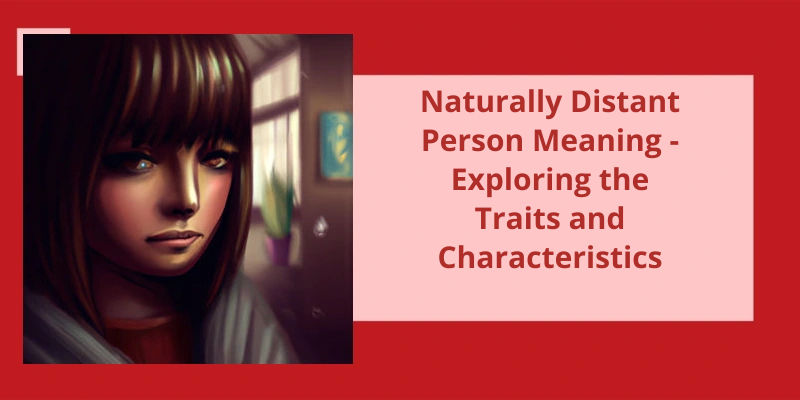In human interaction, we often come across people who seem to be disconnected or emotionally distant. This can be portrayed through their body language or lack of communication, making it difficult to establish a connection or form a bond. While distance can be perceived as a defense mechanism, it can also be a result of personal character traits or past experiences. Hence, understanding the root cause of a person's distance can help us approach them in a non-threatening manner and foster a positive relationship. In this context, the term 'naturally distant person' refers to individuals who may not necessarily be deliberately aloof but instead possess an innate tendency to maintain a certain level of emotional distance from others. Identifying and respecting such traits can ultimately lead to a better understanding and collaboration with these individuals.
What Does It Mean to Be Distant From Someone?
Being distant from someone can mean a multitude of things depending on the context of the situation. It can mean physical distance, emotional distance, or simply a lack of familiarity with someone. Being distant from someone can lead to feelings of isolation and loneliness, as well as a lack of trust and communication.
Long periods of time apart can lead to a feeling of disconnect and difficulty in maintaining a strong relationship. However, physical distance can also lead to a deepening of a relationship as the individuals learn to communicate and connect in new ways.
Emotional distance can be even more challenging to overcome. This can be caused by a variety of factors such as past trauma, fear of vulnerability, or a need for independence.
This can happen when meeting someone new or encountering someone from a different culture or background. Overcoming this type of distance requires a willingness to be open-minded and learn about someone elses experiences, as well as a commitment to building a relationship based on mutual respect and understanding.
Being distant from someone can also have negative effects on ones mental health. However, taking steps to overcome distance and build connections with others can lead to a happier, more fulfilling life.
Building strong connections with others is essential to maintaining good mental health and living a happy, fulfilling life.
Different Types of Physical Distance and How They Impact Relationships
This article discusses the various types of physical distance and how they can affect our relationships. It explores the differences between spatial, temporal, and social distance, and explains how each type can impact our emotional connections with others. Ultimately, understanding these different types of distance can help us navigate relationships more effectively and improve our overall well-being.
As we explore the concept of distant, it’s important to note that this word can be used in various contexts. While it typically pertains to physical distance, it can also be used to describe time or events that are far removed from the present. Whether discussing a distant horizon or the not too distant future, this adjective conveys a sense of something far away and sometimes out of reach.
How Do You Use Distant?
When using distant to describe a location, it can refer to a place that’s physically far away, such as a distant land that one has yet to explore. It can also be used to describe a person who’s emotionally or psychologically distant, perhaps someone who’s aloof or detached from others.
In terms of time, distant can refer to events or periods that are long gone, such as ancient civilizations or prehistoric times, which are both distant in the past. It can also refer to future events or eras that are anticipated but haven’t yet arrived, such as a distant future where technology has advanced beyond our current understanding.
Using distant in conversation can be a way to express hope, by referring to a better future that’s within reach but not yet fully realized. It can also express longing or nostalgia for a time or place that’s far away, either in the past or the future.
Source: Distant definition and meaning | Collins English Dictionary
However, there are many factors that may contribute to this emotional distance, and it’s important to understand them in order to work towards reconnecting with your partner. In this article, we’ll explore some common causes of distance in relationships and offer tips on how to overcome them. So, whether you’re experiencing emotional detachment yourself or noticing it in your partner, keep reading to learn more.
What Does Being Distant in a Relationship Mean?
This time apart can be a chance for them to focus on themselves and figure out what they want from the relationship. On the other hand, if the distance persists, the relationship may come to an end. A lack of communication and emotional intimacy can lead to partners feeling neglected or unimportant.
Being distant in a relationship is a common issue that many couples face. It can be the result of a variety of factors, from external circumstances to emotional issues. However, open communication and a willingness to work on oneself can help couples overcome the distance and deepen their connection. Ultimately, it’s up to the individuals involved to decide what they want from the relationship and whether the distance is something they’re willing and able to work through.
How to Overcome Distance in a Long-Distance Relationship
Overcoming distance in a long-distance relationship may involve regular communication through different platforms, setting aside time for virtual dates, planning visits and trips to see each other, and building trust and understanding in the relationship.
If you’ve ever dealt with someone who comes off as cold or distant, you know how frustrating it can be. Whether it’s a coworker, friend, or family member, the challenge lies in figuring out how to bridge the gap and connect with them on a deeper level. Fortunately, there are several ways to tackle this issue head-on and create a more meaningful relationship. Here are six strategies for dealing with people who’re distant.
How Do You Address Someone Who Is Distant?
Maintaining relationships can be challenging when dealing with people who’re distant. Distant individuals can be difficult to decipher and understand, which can make communication and connection feel like an impossible task. If youre struggling to connect with someone who’s distant, here are a few tips to help you navigate these relationships.
Another important strategy is to open yourself up. Individuals who’re distant may struggle to share their own feelings or thoughts, but you can lead by example. Talk about your own emotions and thoughts to help create an environment where the other person feels more comfortable doing the same.
Giving distant individuals time is also crucial. Trying to force someone to open up before theyre ready can have the opposite effect and make them withdraw even further. Be patient and let them come to you when they feel comfortable and ready to share.
When communicating with someone who’s distant, be frank and direct. Vague communication can lead to misunderstandings and frustration. If youre feeling confused or unsure of what the other person wants or needs, don’t be afraid to ask for clarity.
Pay attention to what works and what doesnt. Everyone is different, and what works for one person may not work for another. Try different strategies and approaches, but be willing to adjust as needed for the best result.
Finally, respect your differences. Everyone has their own unique communication style, and thats okay. Rather than trying to change someone who’s distant, try to focus on understanding and accepting them for who they are. With patience and persistence, you may be able to build a stronger, more meaningful relationship.
When we want to describe something that’s further away, we often use the phrase “more distant.” However, there are many other words that can convey the same sentiment, each with their own nuances and connotations. In this article, we’ll explore some of the top synonyms for “more distant” and how they can be used in different contexts.
What’s Another Word for More Distant?
Finding synonyms for more distant can be a daunting task, especially when you want to avoid using the same word repeatedly. Luckily, there are many words you can use to convey this meaning, each with it’s own unique nuance. One of the most common synonyms for more distant is further, which suggests a greater physical or metaphorical separation between two things. Beyond is another option, which implies that something is located or exists on the other side of a boundary or threshold.
For instance, you might say that a city is longer away than you originally thought, or that a project will take longer to complete than expected. If you want to convey a sense of being far away in a more poetic or literary way, you might choose to use the word remoter, which suggests a greater emotional or psychological distance rather than a physical one.
For example, if youre trying to describe a person who’s shy or reserved, you might choose to use the word withdrawn, which suggests a sense of being emotionally or socially removed from others. On the other hand, if youre trying to describe a place that’s hard to get to or difficult to reach, you might choose to use the word inaccessible, which implies that there are physical barriers preventing you from reaching your destination.
Ultimately, the choice of synonym will depend on the specific meaning youre trying to convey, as well as the tone or style of the piece of writing youre working on. Whether you opt for more common words like further and beyond or more obscure terms like remoter and withdrawn, the key is to choose words that accurately capture the meaning you want to convey and that fit seamlessly into the overall flow and structure of your writing.
Examples of Using Synonyms for More Distant in Different Types of Writing (e.g. Academic, Creative, Technical)
- Academic Writing:
- Farther away
- More remote
- Distant in space or time
- Removed from
- At a distance from
- Creative Writing:
- Afar
- Far-off
- Outlying
- Far-flung
- Removed
- Technical Writing:
- Further
- More remote
- Distant from
- Away from
- Separated from
When describing something that’s far away in space or time, the word distant is often used. However, there are many other similar words that can be used, such as faraway, far off, and remote. On the opposite end of the spectrum, there are words like near and recent that can be used to describe things that are close in proximity or time. It’s important to choose the right word depending on the context and meaning you want to convey.
What Is a Better Word for Distant?
When it comes to describing distance, the English language offers us a plethora of options. From “faraway” to “remote,” “outlying” to “off the beaten track,” there are many ways to convey a sense of being distant in space or time. These words can be helpful for writers looking to add detail and specificity to their language. By choosing different words to describe distance, they can paint a more vivid picture in the minds of their readers.
However, it’s worth noting that not all words for “distant” are created equal. Depending on the context, some might be more appropriate than others. For example, “faraway” could be used to describe a beautiful, isolated beach, while “remote” might be better suited for describing a deserted, inhospitable landscape. Similarly, while “ancient” might work well for describing a historic monument, “antediluvian” might come across as overly grandiose or pretentious.
In addition to words for physical distance, there are also words for emotional distance. Describing someone as “cool,” “reserved,” or “detached” can convey a sense of aloofness or emotional distance. These words might be useful in describing characters in a story or writing about difficult interpersonal relationships. However, again, it’s important to consider the context: calling someone “haughty” might be appropriate in a certain situation, but in others, it might come across as needlessly negative or judgmental.
When looking for alternative words for “distant,” it can be helpful to consult a thesaurus or dictionary. This can give you a broader sense of the different words available and their nuances. However, it’s also important to use these words thoughtfully and intentionally. Choosing the right word for the right situation can help your writing feel more polished and effective.
Conclusion
In conclusion, the label of being a naturally distant person holds a great deal of complexity. It suggests a tendency towards distraction and a lack of focus, however, this doesn’t necessarily equate to a negative personality trait. Understanding and accepting one's own tendencies towards dissociation can lead to self-awareness and improved communication with others. It’s important to recognize that being distant can also be a mechanism for self-preservation and shouldn’t automatically be labeled as a flaw. Ultimately, the meaning and implications of being a naturally distant person are subjective and nuanced, and should be approached with careful consideration and a willingness to understand.






